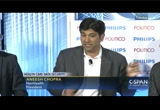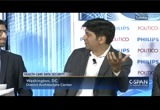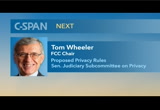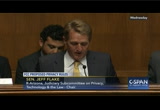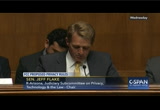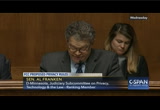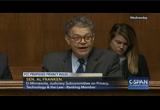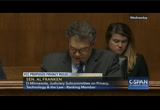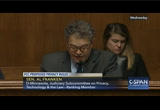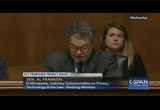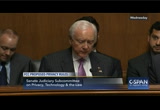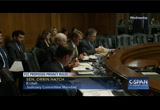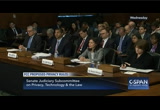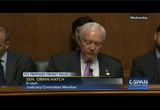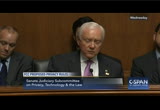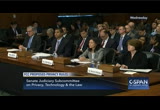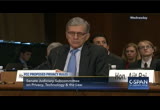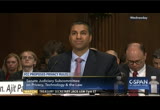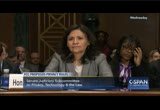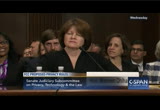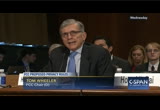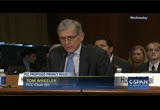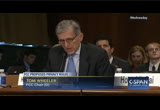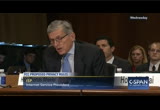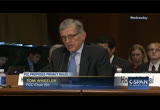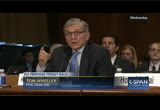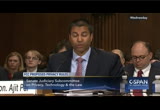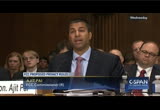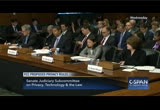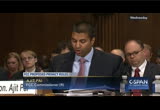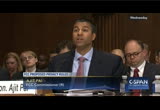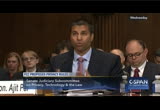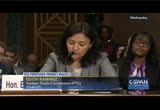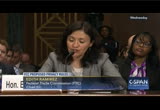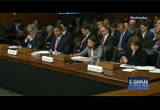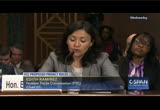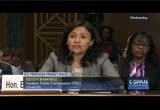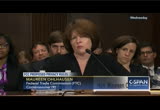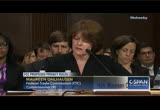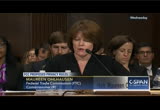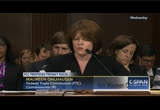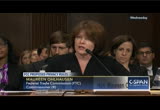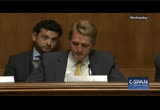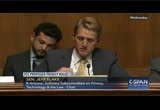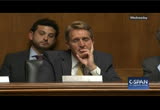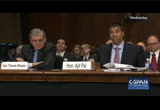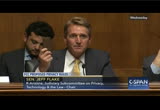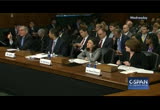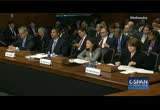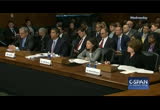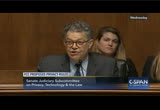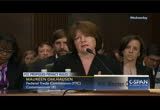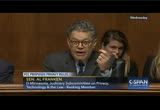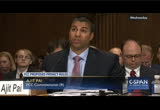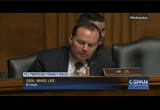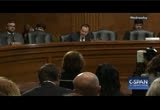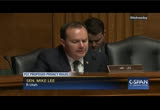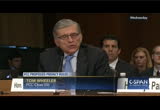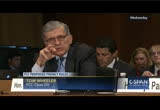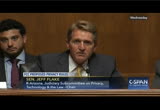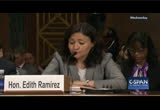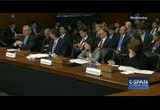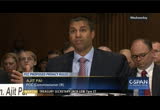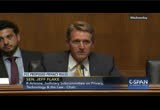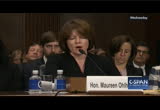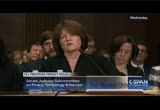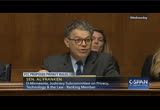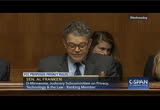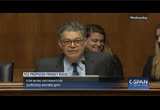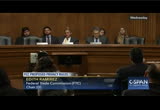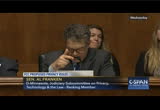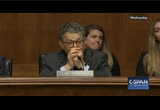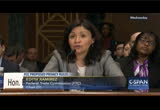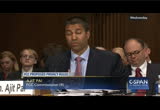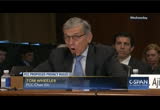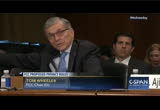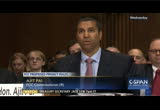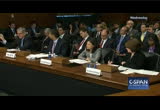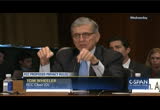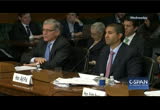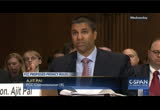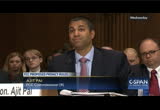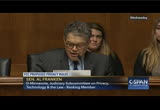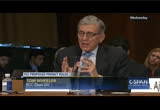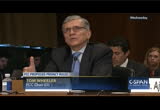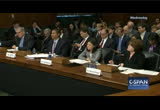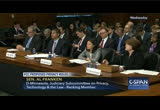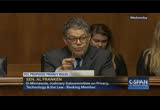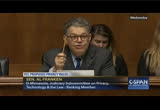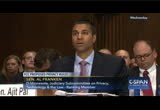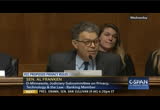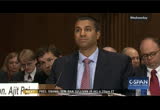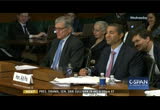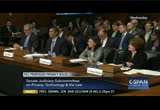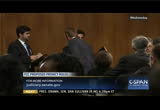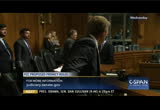tv FCC Commissioners Testifies on Proposed Internet Privacy Rules CSPAN May 14, 2016 4:44pm-6:21pm EDT
4:44 pm
is caring for a couple thousand patients could not figure out which patients whose background or condition may have a heart attack or hypertension, which of them had elevated blood pressure levels so they need to be managed in a more aggressive way? we as a country could save a million heart attacks now because of the method by which we've basically built up the program. every certified health i.t. system is capable of running a simple query, so nick and his team could say, whoo, who are the 15 patients we didn't know at risk of a heart attack? let's go call them, bring them in, counsel them, let's make it happen. so one final thing. cyber security insurance market, you can't build an insurance market unless there's a standardized data model on which they can insure against. so you needed the government to build standards to know what the root causes of the problems are on which they could then model this.
4:45 pm
there is a yen and again. i get the sentiment. i want to correct the record where i can. dan diamond: a very provocative way to end the panel. if you disagree or agree with any panelists, find them in the lobby. ununfortunately, no more time for questions. for those of you in the room, thank you very much. those watching on the live stream, thank you also. a final thank you for philips. make sure to join us for cocktails. please drink responsibly. do not share your medical information. thank you, everyone. >> thank you. [captions copyright national cable satellite corp. 2016] [captioning performed by the national captioning institute, which is responsible for its caption content and accuracy. visit ncicap.org] announcer: tomorrow, president obama gives the commencement speech to students at rutgers university. coverage begins at 12:50 on c-span. fcc chair tom wheeler dement -- defended the privacy rules for internet service providers. he testified before the senate judiciary subcommittee on
4:46 pm
technology and the law saying consumers should have similar privacy protections while on the internet as they have when using telephone networks. this is an hour and 35 minutes. jeff flake: we're here today to discuss the federal communications commission proposed privacy rules that are currently in the notice and comment phase. the fcc under its most recent net neutrality order have created a vacuum in privacy enforcement when reclassified broadband as a common carrier under title 2 of the communications act. previously, the ftc had successfully enforced privacy against broadband providers . except for the net neutrality order, the ftc would still be doing that.
4:47 pm
over the last ten years, the ftc has brought a number of enforcement actions against broadband providers. however none were a result of privacy violations. given that, many wonder what justifies the new proposed rules which are a significant , deviation from the ftc's approach and more burdensome as well. in fact, there are widespread concerns that the proposed rules are another step in the fcc's attempt to become the policemen of the internet. these rules will also have a number of problematic consequences. first and foremost, the proposed rules will impose static regulations on a dynamic and innovative internet ecosystem. would we have the same internet today if these prescriptive rules were imposed a decade ago? i'm concerned that we would not. additionally, it's likely that these regulations would only confuse consumers and give them a false sense of security. finally, there are serious legal questions surrounding the
4:48 pm
proposed rules, in particular, are they consistent with the first amendment? to discuss these issues, we've assembled what i believe to be the perfect panel. we have the chairpersons and minority members of both the fcc and the ftc to provide their perspective. i thank them for appearing here today. i look forward to the testimony. senator franken will give his opening statement and then i'll , swear in and introduce the witnesses. al franken: thank you mr. , chairman. i want to thank you for holding today's hearing on the fcc's proposed rules and the very important issue of consumers' online privacy. chairman wheeler, chairwoman ramirez, commissioners pai and all house and -- olhousen, thank you for appearing before the subcommittee. a little over a year ago, the fcc voted to preserve a free and open internet. it was a very exciting moment for supporters of net neutrality.
4:49 pm
and that means it was a very exciting moment for a whole lot of people. nearly 3 million consumers and business owners spoke out and urged the fcc to adopt rule s that would ensure the internet remain the platform of free expression, innovation, and economic growth that it always has been. it was a very exciting moment for me and remains one of the highlights of my career in the united states senate. many of my colleagues and i long fought for strong rules, and we argue that these rules should be be grounded in the fcc's authority under title 2 of the communications act. if they were to survive judicial scrutiny and withstand the test of time. now that very question is currently before the d.c. circuit, and we could see a decision from the court any day now. but as we await that ruling, the
4:50 pm
fcc has a job to do. since the open internet order went into effect, the fcc has had a responsibility to implement privacy rules to protect consumers, promote competition, and ensure that broadband providers are given certainty with respect to their obligations under section 222 of the communications act. so i commend the fcc for starting this necessary process. for my part, i believe americans have a fundamental right to privacy. they deserve both transparency and accountability from companies that have the capacity to trade on the details of their lives. and should they choose to leave personal information in the hands of those companies, they certainly deserve to know that their information is being safe guarded to the greatest degree possible. now this transparency and
4:51 pm
accountability should come from havehe companies that access to americans' sensitive information. this includes telecommunications providers like comcast and at&t but also edge providers like , google, facebook, and amazon. i have repeatedly pressed website operators and other online service providers to ensure that their customers have more information about the data being collected about them, about how the data are being used, and whether the data are being shared or sold to third parties. here, the fcc has an obligation to specifically address broadband providers' collection and use of americans' personal information, and we're talking about a whole lot of personal information. isps have easy access to americans' unencrypted online communications and browsing histories, as well as well as internet usage patterns which
4:52 pm
can provide a lot of insight into people's daily lives and habits. practically speaking, this means that comcast knows exactly what ails you when you visit web md's symptom checker or that you recently experienced a major life event when you're browsing maternity clothes on target.com. it also means that comcast can tell if your home internet connection, which may be silent during the day, suddenly starts seeing increased use between the hours of 9:00 and 5:00. combine that information with the browsing history of employment bulletins, and comcast can infer that you've recently lost your job. simply put, isps know the most intimate details of our lives and, even worse, americans have no choice but to hand over this information or forego access to broad broadband, something we
4:53 pm
have repeatedly recognized as an essential service in today's world. currently, more than 55% of americans have just one option for broadband service. so subscribers who object to their provider's privacy policy are simply out of luck. this is unfair and unacceptable. i see today's hearing as an opportunity to think carefully about how americans' data are currently being collected and used, and what we must do to ensure that consumers receive the highest standard of protection. i look forward to the testimony of our panel. thank you, mr. chairman, again for holding this important hearing. jeff flake: thank you, senator franken. senator hatch is here now and needs to leave somewhere else pretty soon. glad he's here, and we'll allow him to make an opening statement now. orrin hatch: i'm headed to the white house after this. thank you, mr. chairman for
4:54 pm
, holding this important hearing. i'm a strong proponent of free and open internet. i recognize the need to allow the internet to continue to flourish and to drive our economy while also protecting consumers' privacy and data security. consumer privacy is an extremely important issue. however, i have significant concerns about the fcc's proposed privacy rules for broadband internet service providers. and like many of my colleagues, i believe that the fcc's 2015 open internet order which unilaterally reclassified broadband providers as common carriers under title 2 of the communications act, was a serious overstep of the agency's statutory authority. now, this major policy shift with far-reaching implications well beyond the fcc's current jurisdiction should have been made by congress. for decades, the ftc has been effective in enforcing and
4:55 pm
protecting consumers on the internet. now, however, the fcc's misguided open internet order must put the ftc of regulatory enforcement authorities over internet providers. why is the fcc, which has less capability and less expertise in this area, not following the ftc's well-established and effective privacy policy regime? rather, the fcc is proposing privacy rules that apply exclusively to internet service providers, creating a potentially confusing and unfair set of rules for both consumers and businesses. i am concerned that these proposed rules, which do not apply to edge providers, will allow competing entities to collect the same consumer data while subjecting some, but not all, to a completely different system of rules and regulations. second, i am following closely the issues surrounding the so-called set top box rules
4:56 pm
proposed by the fcc. technological advancements have provided consumers with almost limitless options to watch pay per content on an array of smart tvs and other devices. now, streaming technologies have freed consumers have costly and cumbersome set top boxes. to date, the fast growing streaming market has forced cable and internet service providers to be more ninlmble and competitive with consumer choice. this committee has exclusive jurisdiction over intellectual property rights protections. as such, i continue to be concerned about how the proposed set top box rules will impact video content. unfortunately, many believe that if it's on the internet, it must be free. but producing an distributing video content is not only costly it also requires a legal , framework to license that
4:57 pm
content. approaches that ignore the need for licensing or undercut existing licensing agreements will, in my view, increase costs for consumers, reduce choices and discourage innovation. , i strongly urge you to keep this in mind when considering the set top box issue. third, i would like to comment briefly on the charter-time warner merger which the fcc voted to approve last week with conditions. mr. pai, you dissented from the commission's decision on the ground that the conditions the commission imposed have nothing to do with the merits of this transaction. rather, you said the conditions are about the government micromanaging the internet economy. now, this is not the first time you've raised concerns that the commission is improperly used merger conditions to micromanage the internet.
4:58 pm
last summer, for example, you dissented from the commission's decision to impose 17 pages of conditions on the at&t/directv merger, saying the conditions have nothing to do with the transaction at hand and characterizing them as, quote, the force tribute that the company must offer to nullify the capital, unquote. mr. pai, i want you to know i share your concerns. in fact, i've been troubled recently by a number of commission actions that, in my view, have sought to extend the commission's authority beyond statutory bounds and to push administration priorities in a one-sided way. now i am unfortunately unable to stay, and ask you questions today, but i'll be submitting some for the record so i will look forward to the responses of all four of you. and i just want to express my gratitude that all of you are willing to be here today and help us to understand these issues better.
4:59 pm
i hope we can make some headway together and of course i'm going , to do everything in my power to try and make sure that we live within the framework of the laws. thanks, mr. chairman. jeff flake: thank you. thank you, senator hatch. it's custom to swear the witnesses in, if you'll stand. do you affirm that the testimony you're about to give before the committee will be the truth, the whole truth, and nothing but the truth, so help you god? >> i do. jeff flake: record will show they all answered in the affirmative. i'll go ahead and introduce all of you together and then turn for opening statements. chairman tom wheeler is the 31st chairman of the fcc, a position he's held since november 4, 2013. for over three decades chairman , wheeler has been involved with telecommunications networks and services as a policy expert and advocate and businessman. prior to joining the fcc, chairman wheeler was a managing director of core capital partners, a venture capital firm
5:00 pm
investing in an early stage internet protocol based companies. he served as president and ceo of shiloh group llc, a strategy development and private investment company specializing in telecommunications services and co-founded smart brief, the internet's largest electronic information service for vertical markets. chairman wheeler is a graduate of the ohio state university and is recipient of its alumni medal. commissioner ajit pai has been a commissioner of the fcc since may 14, 2012. between 2007 and 2011 commissioner pai held several , positions in the office of general counsel, serving most predominantly as deputy general counsel. prior to being sworn in as commissioner, pai worked in the washington dc office of jenner and block where he was a partner
5:01 pm
in a communications practice. commissioner pai has served in all three branches of the government, clerking for the honorable martin feldman of the u.s. district and the eastern district of louisiana serving in a number of roles in the department of justice as well as working as chief counsel on the senate judiciary committee. commissioner pai received a ba from harvard university with honors and a j.d. from university of chicago where he was editor of the university of chicago law review. thanks for being here. chairman edith ramirez was sworn in as federal commissioner effective march 4, 2013. prior to joining the commission, ramirez was a litigation partner in the los angeles firm of quinn , emanuel, iraheart, and sullivan. before then, ramirez was an associate of gibson, dunn, and crutcher in los angeles. she clerked for the honorable alfred t. goodman in the united states court of appeals and for the ninth circuit.
5:02 pm
ramirez graduated from harvard law school cum laude where she served as editor of the law review. she holds a bachelor's degree from harvard college. she would probably get along well to the guy to my left here, my far left here. just kidding. [laughter] joking. harvard jokes. commissioner -- >> i get it. [laughter] jeff flake: commissioner marine olhawsen has served as a commissioner for the federal trade commission sings april 4, 2012. prior to joinings the commission she was partner at wilkinson ,, barker where she focused on ftc issues including cyber security and data protection. she previously served on the commission for 11 years, most recently as the director of policy planning from 2004 to 2008, where she led the ftc's internet task force.
5:03 pm
from 1998 to 2001 she was attorney adviser for former ftc commissioner advising him on competition and consumer protection matters. before coming to the ftc, commissioner ole housing spent five years on the u.s. court of appeals for the d.c. circuit, serving as a law clerk for judge david b. seinetal as a staff attorney. commissioner olehousing graduated with distinction from george mason university of law and graduated with honors from the university of virginia. thank you all for being here. we appreciate. i know it's an effort to get you all here. chairman wheeler, if you'll start the testimony, and if all of you will summarize your testimony to about five minutes, we'll include the longer version for the for the record. chairman wheeler. tom wheeler: thank you very much, mr. chairman. it's a privilege to be here and to be with our colleagues from the federal trade commission. you know, the ftc in 2012 set forth some key privacy concepts in their report, and the money
5:04 pm
sentence if you will, in that , report this. broadband networks are, quote, in a position to develop highly detailed and comprehensive profiles of their customers. and to do so in a manner that may be completely invisible. but this is not the first time that society has had to deal with this kind of a technological challenge to privacy. making a phone call also generates similar information about the consumer. long ago, however, society dealt with the problem through an fcc rule prohibiting nonnetwork exploitation of information created by the consumer's use of the phone network. this policy has been in effect for decades.
5:05 pm
the issues aren't new nor is the fcc's expertise. here's an example of how that works. when the consumer picks up the phone and calls, for instance, air france, the phone company is prohibited by fcc rule from selling that information to tour services or hoteliers in france unless the consumer expressly , grants permission. it should be the same thing with the privacy of online information. going to the airline's website should be no different than going to their switchboard. now, of course, the airline may decide to do something with the consumer's information themselves. but there's long been a big difference between the information created by the consumer's transaction with a third party, which is a matter of choice, and the information the consumer has no choice but to provide in order for the network to connect them with that third party.
5:06 pm
thus, the proposal on which we are currently seeking comment welcomes the innovation created by digital networks or retaining the values an the rights that have traditionally applied to network operations. and those values are simple. the information that consumer generates in order for the network to function is the property of the consumer. just because the consumer hires the network to deliver them to a service does not mean that the network can unilaterally take ownership of that information that the consumer provides. and what a trove of information it is. here's what one isp says they collect. quote, a combination of information from wireless and wi-fi locations, tv viewing, calling and text records, website browsing and mobile application usage, and if that isn't enough, other information we have about you and other customers.
5:07 pm
now, there are two things that jump out from that extensive list. one, nothing on that list is the network's information. it's the consumer's information that's been provided to network so the network can operate. and second, there is no choice. this is a, this is what we do, take it or leave it situation for the consumer. and the ftc's privacy report specifically called out this issue of take it or leave it for broadband internet access saying, quote, consumers' privacy interests ought not to be put at risk by such one-sided transactions. now, we respect the network's desire for new revenue from selling digital information created by the operation of the network. but they should not be able to redefine the responsibilities of
5:08 pm
a network simply because the network switched from analog to digital. our proposal provides that networks can use the consumer's information, but they must first get permission from the party whose information it is, the consumer. they can't sell something that isn't theirs, nor should consumers be forced to waive their privacy to get service. the networks need to seek permission of the party whose information it is. and further adhering to well-established principles, our proposal only applies to network providers. in the air france phone call example, what the airline may do with the consumer's information is a transaction separate from the consumer's transaction with the phone company to deliver the call. we do not regulate those with whom the network terminates in the vernacular of today, the edge providers, and this by the
5:09 pm
way includes network affiliates acting as edge providers. and we have never asserted jurisdiction over edge providers and do not assert it now. finally, we are in the midst of building a record in this proceeding, as you indicate, mr. chairman. in keeping with good process, with we put forth proposals to focus the debate and the comments. but it is a proposal, not a conclusion. and we have asked multiple questions about the proposal, its assumptions and details. we will of course build any final proposal on the record that is established in that regard. we look forward to this hearing to further enrich our consideration. thank you, sir. jeff flake: thank you, chairman. commissioner pai. ajit varadaraj pai: chairman flake, ranking member franken, members of the subcommittee, thank you for holding this hearing today. it's a privilege to appear alongside you along our distinguished colleagues with the federal trade commission. and thank you as well for giving me opportunity to testify about
5:10 pm
the federal communications commission's opportunity to -- commission's proposal to selectively regulate internet privacy. every day, millions of americans enjoy the freedom that the internet provides. one reason is the united state'' historic -- regulation when it comes to internet privacy. start-ups haven't had to hire an attorney to navigate complex federal rules, and entrepreneurs have been free to invent and discover new ways to monetize their services without fear of government standing in the way of profitability. as the nation's preeminent federal agency on privacy issues, the federal commission deserves credit. for two decades, it has applied a unified approach to all online actors. the ftc has been quite active carrying out more than 150 , privacy and data security enforcement actions, including actions against isps and against some of the biggest companies in the internet ecosystem. it's been so successful that the u.s. government has touted the ftc's work to the european union
5:11 pm
as officially robust to protect online consumers against predatory privacy practices. but, unfortunately, the fcc tore apart the ftc's unified framework 13 months ago when it reclassified broadband as a public utility. there's now a gaping hole in our privacy protections a hole that , needs to be refilled. how best to do that? i can't put it any better than chairman wheeler did, testifying before congress in november of 2015, because consumers deserve a uniform expectation of privacy, the fcc will not be regulating the edge providers differently from isps. but ignoring that commitment to congress, the fcc decided in march 2016 to target isps and only isps for stringent regulation. regulation far more invasive and prescriptive than the ftc's case-by-case approach. for several reasons, this approach doesn't make sense or, as president obama's first ftc
5:12 pm
chairman and most recent ftc general counsel put it, the the fcc's proposed rules would do little to promote the cause of privacy. first, it makes no sense to give some companies greater leeway under the law than others when all may have access to the very same personal data. search engines log every query you enter. social networks track every person you've met. online video distributors know every show that you stream. and if the fcc burdens one niche of the marketplace with asymmetric regulation, this disparate approach doesn't benefit consumers or the public interest. it simply favors one set of corporate interests over another. second, the fcc's approach strangely singles out new upstarts in the concentrated market for online advertising. as president clinton's chief counsel for privacy and president obama's special assistant for economic policy has recently explained, the ten leading ad selling companies earned over 70% of online
5:13 pm
advertising dollars, and none of them has gained this position based on its role as an isp. he continued, that's because isps have neither comprehensive nor unique access to information about users' online activity. or, as former democratic representative rich boucher wrote recently, by the end of this year, 70% of internet traffic will be encrypted and beyond the surveillance of sisps . isps those who are already winning big in the world of online advertising. that's former ftc chairman lebowitz put it, the big data marketplace will carry on except , ironically, the fcc will have insulated its largest players from isp competition. third, the fcc's proposal may signal the end for ad-based discounts on online services. the agency put in its crosshairs free services in exchange for information as well as programs
5:14 pm
that offer consumers discounts on the broadband service in exchange for consent to use web browsing data to tailor a customer's ads. i don't see how denying consumers such choices is in their interest. finally, everyone in the online ecosystem should recognize that the fcc's decision to target isps is a calculated political choice. in crafting the online regulations the agency relied on , section 706 of the telecommunications act. under the majority's reading of that section, the agency has a power to take practically any action it believes necessary to break down barriers to broadband deployment and adoption, including regulating edge providers. and to be clear, i don't support the majority's reading. but regulating the privacy market practices of isps and only isps is like eating half a meal. at some point, the fcc will want to come back to the table. chairman flake, ranking member franken, members of the subcommittee thank you for the
5:15 pm
, hearing. looking forward to answering your questions and work with you and your staff in the time to come. jeff flake: commissioner pai, thank you. commissioner ramirez. edith ramirez: chairman flake, ranking member franken and members of the subcommittee, i'm pleased to appear before you today with my colleague , commissioner maureen ohlhousen, and alongside chairman wheeler and commissioner pai. today we face new challenges in protecting consumer privacy. with every tap of a smartphone, website search, or online post, data is being collected about consumers. while uses of data can offer tremendous benefits to consumers, the increasing ly ubiquitous collection and use of data is largely invisible and becoming ever more difficult for consumers to control. studies show that consumers care about privacy and want more control over their personal information. in a recent survey by the pew research center, 91% of those surveyed said they feel they
5:16 pm
have lost control over how their personal information is collected and used by companies. i think it's vital that consumers have control over the collection and use of their personal information, and that this information is protected appropriately. over the last several decades , the ftc has undertaken numerous law enforcement policy and education initiatives to address consumer privacy and ensure that consumer information is adequately protected. the commission has used its primary authority under the ftc act to take enforcement action against companies that have engaged in unfair or deceptive practices involving the privacy and security of consumer information. the ftc also enforces sector-specific statutes that protect health, credit, financial, and children's information. our enforcement actions address a wide range of practices including deceptive claims about , how companies collect, share, and use personal information.
5:17 pm
the failure to provide reasonable security for consumers' personal information and violations of do not call and other telemarketing rules. our enforcement actions send an important message to companies about the need to protect consumers' privacy and safeguard their data in both the physical and digital worlds. the ftc has also pursued numerous policy initiatives to enhance consumer privacy. for instance, the ftc has hosted workshops to examine the privacy and security implications of emerging technologies and business models, including comprehensive tracking by companies across the internet ecosystem, big data, the internet of things, and cross-device tracking. we've also issued a number of reports recommending best practices that we encourage companies to adopt. much of our policy work today builds on recommendations from the commission's 2012 privacy report, which sets forth key privacy principles that we believe ought to apply across
5:18 pm
diverse technologies and business models. in that report, we urged companies to be more transparent about their collection and use of data, to use privacy by design and implement privacy and security protections at the outset of product development, and to provide consumers with simple and clear ways to exercise choice over the collection and use of their data. the ftc has applied these principles to a broad array of emerging technologies and business practices, including the internet of things, facial recognition, and data brokers' practices. given the breadth of issues the addresses, we frequently cooperate with other federal and state agencies. we have an extensive history of cooperation with the federal communications commission, including the enforcement of the do not call rule and efforts to stop unauthorized charges on mobile phones. in 2014, for example, working closely with the fcc and state authorities, we entered into two important mobile crowding
5:19 pm
settlements with at&t and t-mobile that resulted in hundreds of millions of dollars in consumer redress. formalized our collaboration with the fcc by a memorandum of understanding to facilitate coordination. and officials announced coordinated studies of security in the ecosystem. in our study, we seek to learn how mobile device manufacturers and operating systems provide security updates to address vulnerabilities. the fcc in turn will examine common carriers' policies regarding mobile device security updates. our goal in working together is to use our complementary expertise and authority to protect consumers as effectively and efficiently as possible, avoid duplication, and promote consistency. i commend the fcc for focusing on the important issue of consumer privacy. the ftc is carefully considering the fcc's proposed rules governing the privacy of consumer information collected by broadband internet access service providers, and we do intend to file a comment.
5:20 pm
in closing, i want to reiterate the fcc's commitment to protecting the privacy of consumers ts data. -- of consumers data. we continue to look forward to working with the fcc and the subcommittee on thisimportant issue. thank you. jeff flake: thank you, chairman ramirez. commissioner ohlhausen. maureen ohlhausen: chairman flake, ranking member franken, members of the subcommittee, thank you for this opportunity to appear before you today with my ftc and fcc colleagues. we're here because of a side effect of the fcc's open internet order which reclassified broadband as a common carrier service. the ftc act has a common carrier exception, and the fcc's order thus halted my agency's decades-long bipartisan efforts to protect internet service. -- to protect consumers of internet service. stepping into the gap the order created the fcc now proposes to regulate broadband isp privacy practices in a manner different from and more restrictive than the privacy framework the ftc
5:21 pm
has long applied to the entire internet ecosystem, which includes social networks, search engines, ad networks, online retailers, mobile apps, mobile handsets, and isps. as our written testimony details, the ftc is the primary u.s. privacy and data protection agency and probably the most active enforcer of privacy laws in the world. we have brought hundreds of privacy data security related cases in all segments of the internet ecosystem, including against isps and large internet companies. in my brief time, i want to highlight two qualities of the ftc's privacy approach that make it particularly effective. first, the ftc seeks to protect consumers' particular privacy preferences. research in our experience shows that consumers differ in how they weigh privacy concerns about their sensitive and nonsensitive information and other important values such as variety, convenience, and cost. thus it is vital to calibrate
5:22 pm
opt-in, opt-out requirements to reflect general consumer preferences about particular types of information. so for example, requiring opt-in consent for nonsensitive information when most consumers would prefer a simple notice or optout choice adds cost and inconvenience without benefits for the majority of consumers. to match consumers' privacy preferences, the ftc takes a two-tiered approach. in some areas, consumer preferences are nearly uniform. for example, consumers generally want to be asked for permission to use their sensitive personally identifiable information, such as medical information or real-time location data and information about children. without consent, uses of such sensitive personal information are likely to cause a substantial unavoidable consumer harm that isn't outweighed by benefits to competition or to consumers. and thus be unfair under section 5 of the ftc act.
5:23 pm
therefore the ftc's unfairness authority establishes a privacy baseline for most practices -- for most practices that require consent. and accordingly, we've brought cases when companies failed to obtain consent for using consumer sensitive information. for many other data practices such as targeted advertising , based on less sensitive information, consumer preferences are not uniform. in fact, they vary widely. in these situations, companies can and do offer a variety of choices to satisfy these varying preferences. using our deception authority, we bring a case when a company makes and then breaks a privacy promise to a consumer that materially affects that consumer's decisions. this approach promotes an honest marketplace with a wide range of consumer privacy practices. the second quality of the ftc's privacy work that i'd like to highlight is our case-by-case
5:24 pm
enforcement. some criticize this approach because we've not established prescriptive rules. but i believe the ftc's privacy leadership is a result and not in spite of our case by case privacy approach. investigating and pursuing hundreds of cases has given the ftc an unparalleled hands-on understanding of privacy problems. our cases test our principles against real facts. our approach allows us to adapt to evolving technologies and changing business models. in our cases, we've studied how consumers react to specific privacy promises and practices and in each of our , hundreds of investigations, we've evaluated the actual or potential harm to consumers of a company's practices and the benefits, if any. so our case-by-case approach far from being a weakness is one of our great strengths. to conclude, the ftc's privacy framework has served consumers well for decades. our case-by-case technology-neutral approach
5:25 pm
respects consumers' preferences, allowing consumers to balance the use of their sensitive and nonsensitive information against other benefits as they see fit. us, i believe our approach provides an excellent model for protecting privacy in the least restrictive or burdensome way. thank you, and i look forward to your questions. jeff flake: thank you all for your testimony. i'll start the questions. chairman wheeler, a couple of questions about the scope of fcc's regulatory authority. if you could answer yes or no if possible on this. does the fcc have the authority to enact these proposed policy rules under section 706 of the 1996 asked? al franken: we are asserting these under -- tom wheeler: we are asserting these under section 222. jeff flake: not 706.
5:26 pm
tom wheeler: it clearly has a bearing on this, but we are doing this under section 222 of title 2. jeff flake: does section 706 of the 1996 act provide the fcc with authority to impose these privacy rules on edge providers? jeff flake: -- tom wheeler: we have said repeatedly that we do not believe or intend to assert jurisdiction over edge providers. jeff flake: commissioner pai, what, based on your understanding of the position as it relates to seven a six, do you agree? ajit varadaraj pai: senator, i do not. i think that while the intention of the agency might be not to apply the regulations at this time to edge providers, the virtual cycle theory that the fcc relied upon both in february 2015 and in the current notice of proposed rule making is certainly elastic enough to encompass edge providers within the scope of any privacy regulations. jeff flake: thank you. chairman wheeler, commissioner pai in his testimony stated
5:27 pm
that you testified before congress that because consumers deserve a quote, uniform expectation of privacy that the fcc would not be regulating edge providers differently than isps. thisis a new rule, is proposed rule consistent with that statement? tom wheeler: so as commissioner , pai reported, i said that we will not be regulating edge providers. the expression different from the network is an issue that we are today, what is being sought to be done today is to change the nature of the role of the network to be one that is similar to an edge provider. and that's where we draw the line. that american consumers have for
5:28 pm
decades expected that because of an fcc rule, that the information that they give to the network is their information, not the network's information. and that ought to continue in this environment as well. and no, we do not intend to regulate the edge. and i find myself in a fascinating position with my colleague here that he's now the expansive interpreter of the statute, and i'm the conservative interpreter of the statute. we do not intend to regulate the edge. jeff flake: commissioner pai, do you have any thoughts on that? ajit varadaraj pai: certainly by the characterization, which i don't share, but more seriously question -- to the question, i think the chairman's exchange last november was very telling because the question was will consumers have a uniform expectation of privacy no matter what they are doing or no matter are who they're dealing with in the only ecosystem? the answer there, and i agreed with the chairman at the time, was yes. that's why fcc would not adopt a different approach, but the
5:29 pm
fcc's approach in march of this year was dramatically different singling out isps for a unique and intrusive privacy regulations i think is both obviously a betrayal of that commitment, but more fundamentally, it doesn't recognize what the white house recognized in the 2012 privacy report when it said that it was critical for privacy regulation to be technologically neutral and to reflect a consistent set of consumer expectations. jeff flake: if i take my phone into my home, say i've flown home to arizona, which i do frequently, and i turn it on airplane mode or turn the wireless off, and i get home and forget to turn wireless back on, or an hour later, i turn the wireless on, so i'm covered by broadband part of the time and an edge provider or cellular service the other, am i regulated differently depending on when i turn my wireless on or
5:30 pm
off? commissioner pai. ajit varadaraj pai: so, senator, certainly the access to information that both isps and edge providers would have would vary dramatically. for example, if you took your smartphone home and you logged on to your wi-fi network, if you then took it on the road and were connected to a cell tower on the way to the senate, if you're in the senate, you connected to the snaet's wi-fi network and if you decided to go to a coffee sxhop log on to their wi-fi network you might have the same device but using multiple different isps across multiple different platforms. the one entity that would have consistent access to all your information would be your edge provider. network, -- for example, for an android smart phone, i can see from here -- it would be google in that case. argued one reason i have that isp's have a small and diminishing access to the information consumers have when they go online. let me answer
5:31 pm
your question specifically. you deserve an answer. one, when you turn your phone on, to be a phone, it is under aspects of section 22 of the telephone communications act. you have privacy, rights, and expectations. the question is, why is it that the same device in your hand when you then say, ok, i'm going to go to the internet -- sorry. all of that information does not belong to you anymore. it belongs to the network. that is the point we are getting at here. you are spot on. when you have a device, one function has privacy protection. are saying- all we is the means to be equivalency between those two. >> thank you, i will follow-up on this, my questions at a later time.
5:32 pm
>> yeah, i just want to clarify this -- senator franken: yeah, i just want to clarify this. my understanding is the question you answered in which -- you were pai asked in an ideal world where consumers have an ideal expectation of privacy in which you said yes, but you immediately said you do not have jurisdiction over edge providers and they are different from isp's. chair wheeler: thank you, sir. that is correct. you have put it in the full context. >> senator -- commissioner pai: there is no mention of a lapdog jurisdiction in the congressman's question. senator franken: it's not up to me. chair wheeler: we are
5:33 pm
stipulating here we do not have jurisdiction. senator franken: let me ask about that then. it's a jurisdiction under title ii? chair wheeler: correct. senator franken: let me ask about the distinction here. --ommissioner or house in you do not want these privacy safeguards for isp's, or you isp'sesser safeguards for or you want more for edge providers? i'm a little confused about what your goal is here. i think the consumers have some whichprivacy rights, and
5:34 pm
direction are you going here? commissioner ohlhausen: senator, you point out some very interesting points -- senator franken: thank you. [laughter] i always liken: compliments. commissioner ohlhausen: yes, a consistente approach across the internet? does the customer understand what the privacy protections are for this part of their message or this part? opt out of targeted advertising will they still get targeted advertising through their browser or things like that? the value of consistency, having betweentent approach the ftc and the fcc because the fcc is now overseeing isp's.
5:35 pm
the second question, is that right place? the what we have determined is opt -- senator franken: i understood .hat from your testimony the question is, because of the way that the rule is written now -- and it is out for comment, obviously. isp's because they are common , areers under title ii regulated the same way phones are. that was chairman wheeler's
5:36 pm
testimony. and you are saying -- and commissioner pie seems to be pai seemscommissioner to be saying, you want to be consistent. so do you want the ice the's to have less regulation -- do you want the isp's to have less regulation in terms of legacy? privacy, or do you want the others, the edge providers to have more? theissioner ohlhausen: research we have done and the approach we have taken in this area, it would be a slightly different standard based on the type of information whether it is sensitive or not -- senator franken: let me hear from commissioner pai. i'm sure we will continue. commissioner pai: thank you, senator. i agree with
5:37 pm
commissioner ohlhausen in full. i would associate myself with the white house here. the internet economy here is due to the fact that we rely on the privacy expectations the ftc developed, which was based on consumer perspectives. senator franken: so, i did not quite get an answer to my question. i think that is closer. i'm over my time. we will come back for another round, i'm sure. inc. you, chairman. >> thank you. the fcc's privacy proposal would of course leave the regulation of edge dividers like google,
5:38 pm
yahoo! to your agency. ftc approach to privacy monitoring was applied to isp's before the fcc declared they were common carriers. do you think the regime has providers -- el commissioner ohlhausen: we have well over 100 cases in this area. we have put some of the biggest players under the order to the agents. we have been effective in this space. reason isp's any in particular need to be or to a higherld regulatory standard, as compared
5:39 pm
to other internet companies that participate in the consumer data market? commissioner ohlhausen: going , which the 2012 report others have mentioned, what we said in the word -- in that they seek the extent to comprehensively track consumer activities, that might raise heightened privacy concerns. we did have a workshop on the issue. i would a it's not unique to i.s. wii's. isp -- to isp's. >> you see a distinction? commissioner ohlhausen: in my view, what information do they have about consumers? is it sensitive information? how are they using it? >> commissioner wheeler, it was brought to my attention that a
5:40 pm
letter that was sent to you recently regarding potentially thousands of comments filed with respect to your agency's privacy proposal, those have been submitted, and they appear to be missing from the public docket. as of tuesday evening, this docket showed only 26 filings. to 2200gs, compared comments submitted. i would like to submit that record -- that letter for the record, without objection, thank you. commissioner wheeler, can you explain why these comments have not appeared on the public docket in a timely manner? yes, sir.ler: isunderstanding is there
5:41 pm
some software glitch with the group downloading these comments wasasse, and there something in the software that did something strange to our in the but we are process of remedying this so they will be all online. ok, just a glitch that you are working on? chair wheeler: yes, sir. senator lee: a glitch to make sure you are willing to commit to get those posted? chair wheeler: yes, sir. you have pending regulatory action as relates to set-top boxes. thate has a comment saying privacy protections are adequate to policing private information and set-top boxes reduce your agree with that? if not, why not? chair wheeler: obviously these are two separate proceedings. what we want to make sure happens is the requirements in
5:42 pm
section 631 and 338, which apply to cable and satellite providers also apply tovacy anyone providing a competitive we workbox, and that together with our colleagues at the ftc on an enforcement mechanism. and to the extent google believes they should be exempt from that -- at least one commissioner disagrees with that. ok.tor lee: how do you see that playing out? chair wheeler: we have the same kind of notice and comment proceeding on that underway now, sir. senator lee: ok. thank you very much, mr. chairman. these regulations been in effect for the past couple of decades that the ftc has been regulating privacy, would we see
5:43 pm
the innovation we have seen in the internet with these more stringent perspective -- prescriptive roles in place. ramirez: we are in the process of evaluating the proposed rule. what i can tell you is the way that we have sought to balance innovation and consumer protection, and while there are still questions that you are looking at as to whether isp's ought to be treated differently thehis particular instance, applied is oneve that focuses on the nature of the information being collected and used, particularly the
5:44 pm
information and expectations. commissioner wheeler: senator, may i -- flake: sure, after commissioner pai. commissioner pai: the innovation is due in part to the fact that an approach that allowed them to experiment with consumer preferences. i think that is part of the reason why -- chairwoman ramirez pointed out last november there are things like cross tracking that provide benefits to consumers. if you're looking for shoes on your computer and get a discount on your smart phone. assure onwatching your tv and transferred to your mobile device. there is no telling how much poorer consumers would be if we artificially restricted the use of that kind of cross device information. chairman flake: thank you.
5:45 pm
german wheeler. commissioner wheeler: thank you. -- the firstbegan darpa networks were on telephone networks using dial-up modems, and those activities were subject to the fcc's privacy protection rules, at the very same time the internet went like this. flake: commissioner pai? the dawn of pai: the internet is not the time we think of as most robust in terms of innovation. last twobeen the decades with the ftc at the helm. they were not regulated as common carriers. --it is hard to remember to
5:46 pm
to remember the days of cd-roms being sent to our homes. commissioner wheeler: aol was delivering over the dial-up internet, and i think i understood the question to say was the kind of regulation that we are proposing, if it had been proposed -- imposed in the early days of me and her neck, would we have had the gross, and i am -- all of the internet, would we have had the growth? it all happened on a common carrier network that had privacy expectations. : my concern would be -- certainly i assume that aol, the old service i used to have, we could very well see the growth, slow growth under this regime. i'm just wondering if we would
5:47 pm
overhe growth we have seen the past few years and would expect for the next couple of years with more innovation possible. , the ftc has a long history of dealing with these privacy issues. we went through a long process to build these regulations. a series of workshops, privacy experts, advocates, industry stakeholders. this is all in the report in 2012. the fcc, on the other hand held one workshop a year ago and then a year later issued this complex nprm. gone through the deliberative process in your did in terms ftc
5:48 pm
of how to regulate? commissioner ohlhausen: you have mentioned the process the ftc has undertaken and it has been a long-term, iterative process. the first workshop was held in 1996. which hasr approach been an commensal and technologically neutral, and is said,oman ramirez consumer expectation and has helped us develop our approach in a way that gives us the flexibility and the understanding -- as consumer expectations and technology has changed. the fcc approach, obviously, this is a follow-on to the reclassification that was undertaken in the over the and or net order. it has been a much more
5:49 pm
abbreviated process, in my understanding. chairman flake: senator franken? franken: commissioner pai, in his opening statements,'s spoke about his opposition to the open internet. chairman flake spoke about the innovation on the internet and whether this will slow it down or something. it seems to me the whole point of what reclassification was was to preserve net neutrality. and that's because every time the fcc had tried to preserve net neutrality, the circuit court rejected them. -- as i saided to
5:50 pm
in my opening statement -- the d.c. circuit court is going to be ruling on this. now ord be right now or now. [laughter] senator franken: or maybe they do not do it on wednesdays. commissioner wheeler: tuesdays and fridays. ok, well, notn: now. thank you. i should have known that. because i went to harvard. thank you. are you happy? you didn't know that? ?hat i went to harvard the point is, we talk about 706 know,at is like pre- you open internet. neutrality, this order. i just want to clarify what we're talking about here. because it seems that now this is reclassified as a common , this proposed rule,
5:51 pm
which is a proposed rule -- we are getting comments to the rule. it seems to me that -- i don't think this endangers the growth of innovation on the internet. what would have endangered innovation on the internet would have been to lose net neutrality. that is what millions and millions of americans wrote into the fcc about. so, if you are talking about what consumers want, whichsioner ohlhausen --
5:52 pm
is the proper pronunciation -- [laughter] it just seemsn: be talkingwe need to about what we are talking about here. which is this is reclassified as a common carrier like the phone company, and that means the fcc has the authority over privacy. i want to talk maybe about the ftc and the fcc working together , because i believe they have worked together in the past, and right,ve the ftc -- am i chairwoman ramirez -- if you have worked with lots of different agencies. you worked with the fda, right? chair ramirez: absolutely, senator franken.
5:53 pm
we have a history of working with a number of agencies. we have worked with the department of justice. we have worked with the consumer financial protection bureau. i already mentioned in my opening remarks we have an extensive history of working together with the ftc and a number of areas including telemarketing. those are just a few examples. senator franken: so, this is not new. i am kind of hearing suggestions the ftc is the prime privacy protection agency and for this reason, we must not take away authority to regulate broadband providers, and i'm not they do not play a protectingle in consumer privacy is -- i guess, chairman wheeler, before my time is up, can you talk about the fcc's history and why, in your
5:54 pm
fcc is the proper entity to regulate privacy? wheeler: a couple of things, senator. we have been in this business for a couple of decades. , the ftc, and the fcc as recently as 24 hours ago worked together on a privacy issue. that bifurcate exactly the same are discussing here. and that's the issue of mobile security. one of the problems with mobile is there appears to be -- i do not want to judge this. we are inquiring. is difficulty in speedily
5:55 pm
getting to mobile devices the kinds of patches necessary to information onr those devices. we have jurisdiction over the networks that deliver to the devices. the ftc has jurisdiction over the devices. so, we work in tandem and as recently as yesterday, we put out a series of inquiry is to those who we have responsibility for. they put out a series of inquiries they have responsibility for. they were done on a coordinated basis with us working together like this. that's not an isolated situation. i think that's the kind of reality we will see going forward. we are responsible for networks. they are responsible for edge providers. senator franken: sounds like a model way for regulatory agencies to work together in tandem.
5:56 pm
>> just a couple more questions. chairwoman ramirez, in your view, how has the ftc's privacy protection regime been sufficient to effectively protect consumer's rights as relates to isp's? chair ramirez: chairman, i think the federal trade commission is done a very effective job in addressing consumer privacy and ensuring that consumer information is appropriately guarded. i have mentioned that links a number of initiatives in this area, as has commissioner ohlhausen. i think there are certain areas where we could use additional authority. one example is the commission has, on a unanimous basis, called for congress to enact security legislation because we believe that more needs to be done in that area and we could use additional tools to address
5:57 pm
the protection of consumer information. that's just one example. but i do believe we have been an effective agency when it comes to privacy. chairman flake: commissioner ohlhausen, do you have anything to add? commissioner ohlhausen: i agree completely with the chairwoman. what protections to isp's c and does it change? commissioner pai: it has changed over time. currently, 70% and going up of all internet traffic is encrypted. if you go on your laptop and access your gmail account, you will see the isp can only see you are accessing google. gmail. if you do a google search, the isp can only see your accessing google and the domain of the site you linked on. put in,'t research you the product you're looking at, and so forth. that's part of the reason the
5:58 pm
policy/former uneconomic -- on economic policy has said that isp's have a limited amount of consumer information. that's just on one device. home there aree something like six. it will go up to 11 by 2018. isp's have just a smidgen, but compared to other players in the online at go system, that's part of why the online advertising that is seen as a relatively new and minor competitor compared to competitors that have a lion's share of the revenue. chairman flake: thank you. you go back toif what i said in my statement -- let me read what one company says. a combination of information from wireless and wi-fi -- we can tell where you are sitting in a room from your wi-fi
5:59 pm
location. tv viewing, calling and texting records, website browsing, mobile applications -- every mobile application use, every website you go to, and i respectfully disagree with on theioner pai assertion that somehow encryption will solve everything. first of all, there are about 85% of the top 50 websites that are not encrypted. if they were encrypted, you go to the examples that senator franken gave in his example, you go to web m.d., and the next level down, which is information about this cancer were that cancer. seeyou may not be able to what is coming up with this cancer, but you know that you have gone to web m.d. and then you know you have gone to all of the other url's,
6:00 pm
www.prostatecancer.org, whatever it may be. from that you can put together knowledge about individual that should not be sold by the network. the network is just taking you to get that information. they don't have the right to turn around and say, hey, i've got information on who's got cancer. at its wrong. they can do it with a phone call. they should not be able to do it on the internet. -- they can't do it with a phone call. commissioner pai: if i can respond, i am pleased that the chairman has not refuted my assertion that upwards of 70% of traffic is encrypted. certainly that is the bulk of consumer content. the example i gave earlier about your smart your smart phone.
6:01 pm
the eye is the connection to your home in that example. -- hashas an information the information. google knows exactly what kind of cancer you are looking at, what providers see me have looked at, how worried you are based on your search queries. all your isp knows is you access to google and the domain name -- not the entire url, just the whereas the edge provider knows all of the pages you looked at and can tailor advertisers accordingly. i and please the chairman is not disputed that the edge providers are the dominant players in the market here, online advertising. chairmanhy former leibowitz has said it is odd to single out isp's when there are new competitors in the space. chair wheeler: here's the interesting thing. when i go to google to find
6:02 pm
, that is acer.net decision i am making. it is my choice. i don't have that kind of choice on the information that i give my network. it's going to take that information regardless. to network has the right look at every piece of information. i go to web m.d. and web m.d. collects information. i go to weather.com and weather.com collects information on me. i go to facebook and facebook collects information on me. that only one entity collects all of that information that i am going to all of those different sites and can turn around and monetize it, and like i say, we are in favor of them being able to monetize it. they just need to be able to ask permission of the people whose information it is. the fact that i hire the network prostatecato
6:03 pm
ncer.net does not give them the right to my information. chairman flake: one last question before i turned back to to you,tor franken -- senator franken. it has been asked that we extend the comment period here. it was denied in large part because "granting an extension is not the norm." given that it took the fcc over a year to notice the proposed rules and the total nprm is close to 500 , do you think extending the comment period would be appropriate, chairman wheeler? chair wheeler: golly. we have been discussing this issue for half a dozen years. commissioner pai and his objection to the open internet
6:04 pm
again. let's talk about privacy. everybody has been talking about privacy. --n the isp's of peel appealed our decision and went to the court and ask for a stay, they specifically said in these day, we need you to stay this because we need there to be .ertainty on privacy the court said, no, you don't get to stay. we are providing certainty on privacy like you have asked for. a filling up record and there will be a voluminous record on this. thank you forai: the promotion. there are couple of different questions. they took over a year to issue the nprm. i don't think it is much to ask
6:05 pm
for a couple extra weeks for numerous stakeholders to weigh in on these many, many questions. i think commissioner rosen morsel -- commissioner r osenworcel had it exactly right, our colleague, this asks lots of questions. it's important to act on the basis of a fully developed record, and we can do that if we do not give people enough time to comment your the second point i would argue, and this is edition -- everybody knew this was coming. yes, but we did not know how the sec was going to walk through the door. i think a lot of people were misled. they relied on the commissioner 's assurance that we would not be regulating. they would have been shocked if they saw the 500 questions
6:06 pm
proposing very invasive and selective regulations. chairman flake: thank you. senator franken? senator franken: that last comment begs my question again that i asked one or two rounds ago -- i can't remember. because i am, and this is to both of you again, and anyone i'mwants to jump in -- still my sure if you want more privacy regulation on edge providers -- i'm still not sure if you want more privacy regulation on edge providers or isp's. i.s. the -- help me understand the opt out policy you mentioned. if the opt out options the sec would apply to broadband providers would mean consumers -- the sec would apply to broadband providers would mean consumers do not get access to fcc reply to the
6:07 pm
broadband providers would mean consumers do not get access to the internet, is that fair? either you have got to opt out -- if you opt out you don't get internet. chair wheeler: no, not quite. senator franken: not quite? chair wheeler: this is your of the networkt using information -- senator franken: ok, i gotcha. chair wheeler: can i try something on that though, senator? with your permission. here isare dealing with a reframing -- an artful of an historical responsibility to a massive redefinition of what a network does. the debate that is going on here
6:08 pm
is saying, throughout history and network has delivered to and has not used the information of that delivery process, but now because suddenly we have gone to internet protocol, the internet ought to be the same as the edge. this is a massive redefinition of what a network does. in network delivers 28 third party. a network is not that third party. if the network wants to buy that third party, they can operate that as a third-party. but there is always been this betweenship that networks and consumers, we respect the information you put in because it is your
6:09 pm
information and we are only getting it because we have to have the delivery to the end point. about equity and, oh, my goodness, someone will be advantaged over the other, it has always been that way. when i made a phone call to call and order something back in the day when you ordered from 800 numbers and i got on the mailing list of whoever it was, that was between me and them. it was not my network delivered me there without taking my information. that is the change that is trying to be perpetrated at this point i and time, and it is understand that this is a retreat from privacy. whatis a retreat from americans have always expected from the networks -- senator franken: it would be a
6:10 pm
retreat. what i am hearing from these two commissioners. --ause that's -- you know you know, when i was chairman of this committee, i looked a lot .t things like location privacy so, i think edge providers, too, sure -- regulate on privacy. importantk it's very location privacy. we have things here with women slip -- their partners tracking of their partners -- and led to very tragic circumstances, and what i would and what i don't
6:11 pm
understand from you guys, whether you want to see, and it sounds like you said yes. you want less privacy regulation from the edge providers and less for the eyes the's. is that what i am hearing? commissioner pai: my position is very simple. i want to return to the pre-2015 fcc framework, a light touch, e flexible approach, under both democrat and republican administrations. senator franken: but when the isp's were saying we want to charge more to deliver a higher toed, that was a threat what the internet had been from the very beginning. and that's why, after the two court rulings from the circuit fcc -- i think you
6:12 pm
are wrong. i just inc. you are wrong. -- i just think you are wrong. because i want to preserve net neutrality. because that is how we got all of this innovation and growth. , before-- youtube youtube, there was google tv or google video. and it was not good. so, three guys over at a pizza youtube,ted you to -- and a few years later, google youtube for a couple billion dollars. but nobody would have been able to sampled youtube if there was a slow lane and a fast lane. that's what all of this innovation came from.
6:13 pm
we had net neutrality from the internet.ning of the we had net neutrality from the very beginning of the internet. that you're saying no we didn't? commissioner pai: we did not have net neutrality regulations until 2015. youtube was created in the absence of net neutrality regulations. senator franken: there was not net neutrality regulations. there was net neutrality. commissioner pai: i think everyone agrees we should have a free and open internet. if you look at the order, you look in vain for a conference of market failure where i is the's are working as gatekeepers -- senator franken: they were threatening to do it. commissioner pai: i never heard of any threats -- senator franken: you never heard of any threats? wait a minute. let me get the answer to this. you never heard any isp executive say they were considering doing fast lanes and
6:14 pm
slow lanes? commissioner pai: senator, you're point was -- senator franken: one question. commissioner pai: i personally have never heard of any isp executive -- senator franken: you never read of anything? commissioner pai: there is the question of writer's station -- senator franken: oh, oh! commissioner pai: this regulation is absent net neutrality -- senator franken: wait a minute, wait a minute, wait a minute. you are saying you cannot privatization -- prioritization? commissioner pai: i can give you the transcript. senator franken: mr. chairman? chair wheeler: we did do prioritization under title ii. senator franken: ok, there seems to be a very different understanding here. i find it., very, very hard to never heard any
6:15 pm
notussion -- and i'm talking about i is the corporate officer talking directly to you. that's not what i am's laying. -- what i am saying. try it one more time. you ever heard of isp corporate executives talking about pay for prioritization? commissioner pai: i have heard about it and press reports. i have heard about the concern of highest wii's talking about fast lanes and slow lanes. senator franken: of course. commissioner pai: that is what prompted the president to make the comments about prioritization. senator franken: of course. but two minutes ago you said you would never heard of such a thing. commissioner pai: what you said was had you heard and i is the executive threaten -- senator franken: no, no. that is how you are parsing it? that is how you are parsing it.
6:16 pm
you are answering that question so literally, i do not know if i said of or directly had an isp executive say you, you know, i, i'm reallypa thinking of doing this so we can stuff our pockets. that was not my question. went was a reason that we to an open internet order. and that is why there were 4 million comments. and to pretend that was not the case before this committee seems to me to be very disingenuous. mr. chairman, would you like to ask more questions? no, i think they have been through enough.
6:17 pm
i appreciate the testimony. i appreciate what we have heard today. this has been very helpful to us. senator franken: can i put a couple things into the record? chairman flake: you bet. senator franken: mr. chairman, i'm sorry. i have a number of letters from consumer agencies. i would ask for them to be entered into the record. chairman flake: without objection. senator franken: also a statement from senator leahy. chairman flake: without objection. i also want to put in the record letters representing a large cross-section of technology companies, also asking the fcc to follow the ftc approach to privacy -- senator franken: i object. [laughter] senator franken: for the record, note that commissioner pai laughed at that. [laughter] commissioner pai: i will say affirmatively yes for the record.
6:18 pm
senator franken: thank you. chairman flake: i never knew you had to get the record people applauding. anator franken: there is difference between laughter and applause. believe me, i know. also, senator: grassley has a statement as well, let the record show, i also laughed and applauded at senator franken over the years. the record will remain open for a week. this hearing is adjourned. [captioning performed by the national captioning institute, which is responsible for its caption content and accuracy. visit ncicap.org] [captions copyright national cable satellite corp. 2016]
47 Views
IN COLLECTIONS
CSPAN Television Archive
Television Archive  Television Archive News Search Service
Television Archive News Search Service 
Uploaded by TV Archive on

 Live Music Archive
Live Music Archive Librivox Free Audio
Librivox Free Audio Metropolitan Museum
Metropolitan Museum Cleveland Museum of Art
Cleveland Museum of Art Internet Arcade
Internet Arcade Console Living Room
Console Living Room Books to Borrow
Books to Borrow Open Library
Open Library TV News
TV News Understanding 9/11
Understanding 9/11